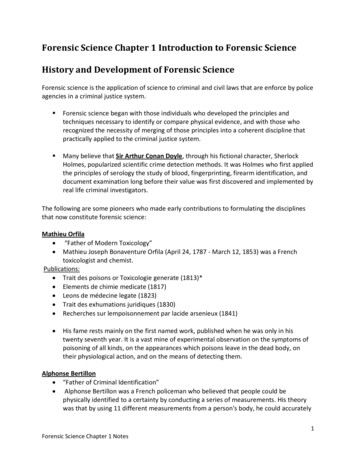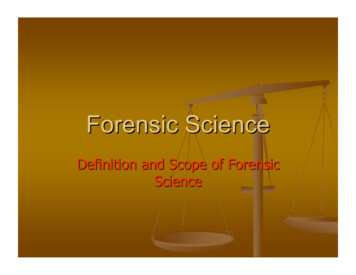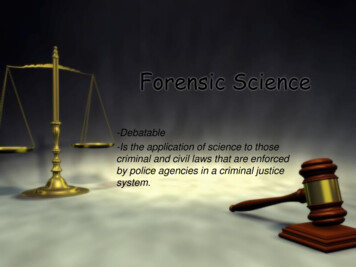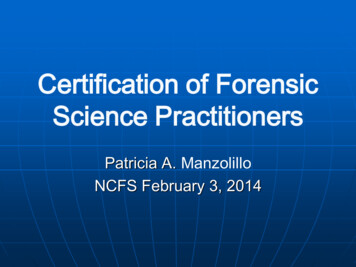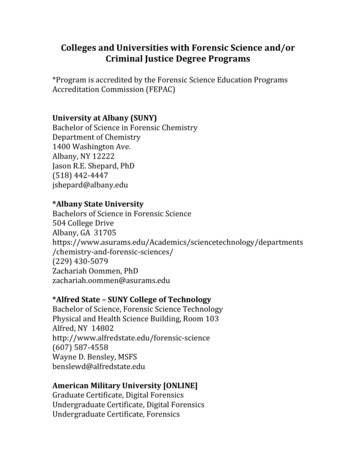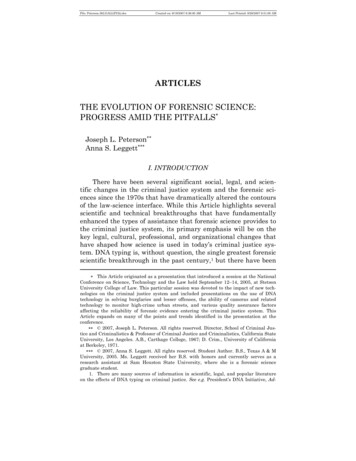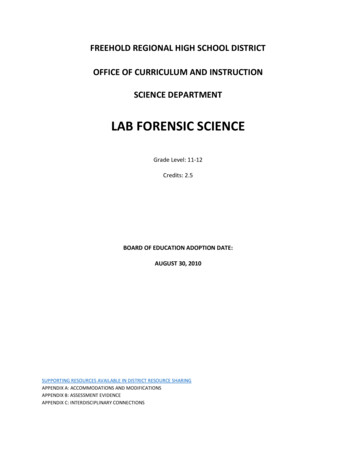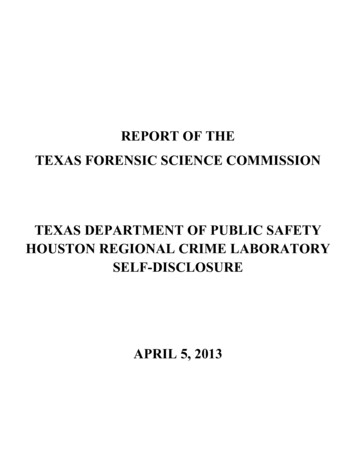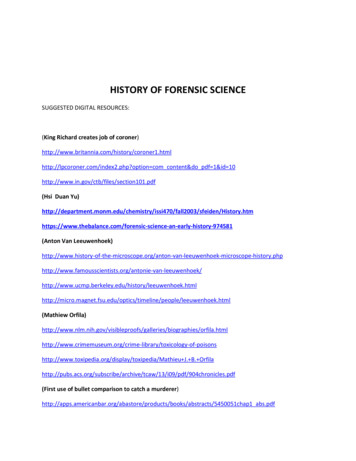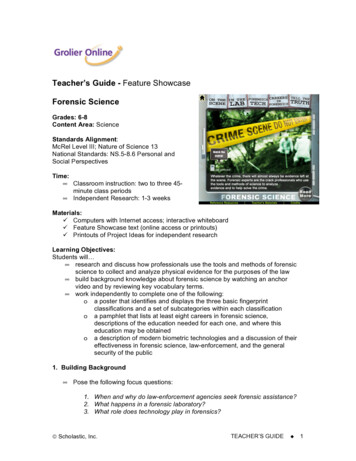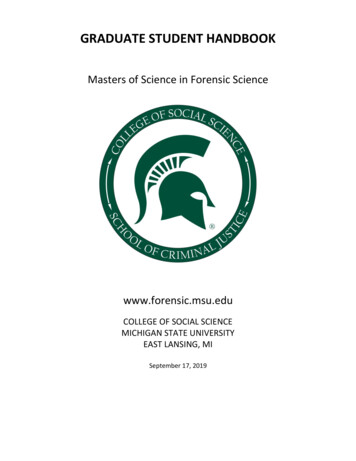
Transcription
GRADUATE STUDENT HANDBOOKMasters of Science in Forensic Sciencewww.forensic.msu.eduCOLLEGE OF SOCIAL SCIENCEMICHIGAN STATE UNIVERSITYEAST LANSING, MISeptember 17, 2019
TABLE OF CONTENTSMission Statement . 1Program Overview . 1Program Components . 3Degree Requirements . 3Admission Requirements . 3Thesis Information . 4Thesis Timeline. 4Thesis Proposal . 4Thesis Committee . 4Human Research Protection Program . 5Thesis Guide . 5Thesis Defense . 6Application to Graduate. 6Checklist for Completion of Degree . 6Exit Survey. 7Departmental Policies . 7Academic Performance . 7Grief Absence Policy . 7Integrity and Safety in Research and Creative Activities . 8Academic Grievance Hearing Procedure . 9Career-Related Services . 16Placement Services . 16Service Learning Center . 16Academic Improvement Services. 16The Writing Center. 16Office of Supportive Services . 16Campus Resources . 17Resource Center for Persons with Disabilities . 17Office of Minority Student Affairs. 17Counseling Services. 17Family Resource Center . 18General Information for Forensic Science Masters Students . 19Academic Advising . 19Academic Standards. 19Campus Parking . 19Change of Enrollment . 20Correction of Grades . 20Deferred Grades. 20Frequently Used Websites and Phone Numbers . 20Graduate Assistantships . 21Mandatory Training – RVSM . 22MSU NetID . 23Required Training and Immunizations . 23Required Masters Seminar Series . 23Responsible Conduct of Research. 23Student Identification Card . 23Time Limit . 24Transfer Credits. 24Withdrawal from the University . 24Course Descriptions . 25
MISSION STATEMENTThe mission of the Master of Science in Forensic Science Program at Michigan State University is to bringtogether the University’s varied forensic science resources in order to provide a state of the art graduatelevel education in forensic science to outstanding students who have achieved a Bachelor’s degree in anatural or physical science and who are highly motivated to enter a career in forensic science.Goals and Objectives:1.To take advantage of the many diverse forensic science faculty and laboratory resources available at MSUin order to develop an intellectual environment that will promote the growth of education and research inforensic science2.To provide a hands-on, research-intensive experience for students that will better prepare them for acareer in laboratory-based science3.To facilitate the attainment of a comprehensive and contemporary Master of Science in Forensic Sciencedegree by graduate students at MSU4.To prepare graduate students for their future professional responsibilitiesPROGRAM OVERVIEWForensic science - the application of the methods of science to legal matters - is an exciting, complex andmultidisciplinary program of study. In it one employs the principles of chemistry, physics, biology, andmathematics, as well as social science theory and law, to help solve crimes and serve justice. Forensicscience offers students who have a Bachelor's degree in a natural or physical science an opportunity toapply their knowledge to serve justice.Michigan State University has long been recognized as a premier institution for research and educationin forensic science and is home to a number of excellent resources for the study of forensic science. TheMaster of Science in Forensic Science program at Michigan State University is designed to give studentsa broad theoretical and practical background in the scientific, legal, and investigative aspects of forensicscience while providing the opportunity to study forensic chemistry in depth.Students in the Forensic Science Program take required courses in forensic science, chemistry, and lawand conduct an independent research project that culminates in a written thesis and oral defense.Conducting research allows students to develop the independence and critical thinking skills that areessential for any forensic scientist. Current research areas in forensic chemistry include developingmethods for the characterization and identification of novel psychoactive substances and developingmethods to predict evaporation of ignitable liquids for fire debris applications.Students are provided with funding to present their research at local and national forensic scienceconferences, giving them public speaking and networking opportunities. In addition, students arestrongly encouraged to publish their research in peer-reviewed journals.1
The laboratory headquarters of the Michigan State Police (MSP) Forensic Science Division isconveniently located near the MSU campus. This full-service laboratory is available as a source ofresearch resources and internship placements. Faculty in the School of Criminal Justice and elsewhereon the campus regularly consult with the state police and students often have opportunities forinternship placements with MSP laboratories. In addition to MSP laboratories, recent internshipplacements have included he State of Michigan Department of Health and Human Services, and theKalamazoo County Sheriff Department.2
PROGRAM COMPONENTSThe Master of Science in Forensic Science with a concentration in forensic chemistry program consists of aminimum of 32 semester credits of course work beyond the Bachelor’s degree and 6 credits of thesis researchtotaling a minimum of 38 semester credits. The student must submit and defend a thesis reflecting originalresearch focusing on a significant problem or issue in forensic science. The oral defense and submission of thethesis must be completed within six years from the time of first enrollment as a Master’s student. The student willneed to select a forensic science faculty advisor who will serve as the chairperson on the thesis committee.DEGREE REQUIREMENTSThe Master of Science program in Forensic Science is available only under Plan A (with thesis). The student mustcomplete at least 38 credits as follows:Credits1. The following courses:CEM 832 - Mass Spectrometry3CEM 835 – Advanced Analytical Chemistry II3CJ 804 – Crime Scene Investigation1CJ 805 – Survey in Forensic Science3CJ 817 Law and Forensic Science2CJ 819 – Forensic Analysis of Drugs and Alcohol3CJ 820 – Forensic Chemistry and Microscopic Evidence3NSC 820 – Scanning Electron Microscopy/Energy Dispersive3X-Ray MicroanalysisPHM 431 – Pharmacology of Drug Addiction3Electives chosen in consultation with forensic science faculty advisor82.FRS 899 – Master’s Thesis Research63.Attend at least one Masters Seminar Series lecture per semester4.Oral Defense of ThesisADMISSION REQUIREMENTSTo apply to the program, students must have a Bachelor’s degree from an accredited institution in anappropriate major, and have maintained a cumulative undergraduate GPA of at least 3.0. Potential applicantsshould be aware that the Master’s program is quite competitive and recent experience has been that successfulapplicants have undergraduate GPAs of 3.5 or higher. Examples of appropriate undergraduate majors areChemistry, Biochemistry, or Chemical Engineering.Applicants should be aware that they may be required to undergo a background check, drug test, polygraph, orother pre-employment test as a condition of employment with law enforcement or other agencies.In addition to all other application material, international applicants must submit TOEFL scores. Applicants mustscore at least 550 on the non-computer based TOEFL, with scores of at least 52 on each subsection of the exam.Those taking the Internet TOEFL must score at least 80 overall, with no subscore below 19 for reading, listening,and speaking; no writing subscore below 22. Students from primarily English-speaking countries may have thisrequirement waived at the discretion of the department and with approval of the Graduate School.Application forms and instructions may be found at sichome.html3
THESIS INFORMATIONTHESIS TIMELINEA student’s research plan should be formalized during the first year of study, in consultation with theforensic science faculty advisor. Master’s students must have a thesis proposal approved by their facultyadvisor and on file by the end of their first spring semester. Students who do not meet this requirementwill be unable to enroll in research credits. Students enrolled in a dual-degree program (e.g. PhD inChemistry and MS in Forensic Science) must have a thesis proposal approved by their research advisorand on file the semester before planning to enroll in forensic science research credits.If a student’s thesis committee chair is not a forensic science faculty member (this may occur if astudent is pursuing a Master’s in Forensic Science and a PhD in a related area), the forensic sciencefaculty member and the committee chair will need to review and approve the proposal. Once approved,the proposal should be signed by the committee chair and given to the graduate secretary to be addedto the student’s file. Students may not enroll in FRS 899 (Masters Thesis Research) credits without athesis proposal on file.THESIS PROPOSALThe proposal should be approximately 3-5 pages long, and submitted to the student’s thesis committeechair. It should include the following sections: Introduction to the problem, followed by a review of the 5-10 most important articles thatdescribe what has already been done in this field and how they contribute to your work.Methods, materials and equipment to be utilized in the project.An approximate timeline for the research, organized by blocks such as months, semesters, etc.Categories may includePreliminary testing (e.g. feasibility studies)Materials/supplies acquisitionSample acquisitionData collection (including subsections)Data analysisThesis writing (plan on multiple drafts)Thesis defenseExpected results, and how they will influence current forensic science practicesTHESIS COMMITTEEEach committee must contain at least three members. At least one must be a tenure-stream facultymember from the Forensic Science program. Another must be a tenure-stream faculty member from theSchool of Criminal Justice, who is not part of the Forensic Science program. The third member of thethesis committee may be a faculty member drawn from the university or from a relevant discipline ofthe Michigan State Police Forensic Science Division or other crime laboratory. This member must beapproved by the Forensic Science program and the student. There may be additional members of thecommittee as described above.4
An exception may be granted by the Dean of the Graduate School to allow a non-tenure stream facultymember or an Academic Specialist to serve on a Master’s student’s examination committee or as thethesis advisor. To request to have non-tenure faculty or Academic Specialists serve on your GraduateStudent Committee, the following materials must be submitted together as a complete packet: Letter from Chairperson of the School of Criminal Justice, with supporting signature from the Deanof the College of Social Science, to the Dean of the Graduate School, requesting that the individualserve on any student committee in that department or for a specific student and why the person isappropriate (e.g. special expertise). Only in very special circumstances will a person be approved toserve as a chair for an individual student’s committee (not blanket approval). Please provide extrajustification of service as a guidance committee chair.Letter from the individual summarizing his/her background and qualifications to serve as a memberof a graduate student committeeCopy of the individual’s vita and individual’s email address.Students should coordinate with the Graduate Secretary to compile material and route it accordingly.HUMAN RESEARCH PROTECTION PROGRAMThe Human Research Protection Program is an Institutional Review Board (IRB). Federal and Universityregulations require that all research projects involving human subjects be reviewed and approved by anIRB before initiation. All forensic science thesis projects must receive IRB approval, even those that donot have direct contact with human subjects (such as secondary data sources). Under the regulations,research is defined as a formal investigation designed to develop or contribute to generalizableknowledge. A human subject of research is an individual (1) from whom an investigator obtains data or(2) about whom the researcher obtains confidential information.Faculty and students must submit the proper forms when the research they will undertake will includeactively gathering the data from human subjects as described above, and/or use of either current orestablished data of human subjects gathered at a previous time. Failure to do so could result in rejectionof your thesis by the Graduate School. Before a graduate student begins any research project, thestudent should consult with his or her faculty advisor or chair of the guidance committee. For moreinformation about the review process, contact the Human Research Protection office at 517-355-2180,irb@msu.edu, or go to 202 Olds Hall. You may also find information at http://hrpp.msu.edu/.THESIS GUIDEThe student should obtain an up-to-date guide for the preparation of the thesis from the GraduateSchool, 118 Linton Hall, or http://grad.msu.edu/etd/. A final copy of the thesis must be submittedelectronically to MSU via ProQuest/UMI.The target date for the FINAL APPROVAL of an electronic Thesis or Dissertation to the Graduate Schoolfor graduating the semester of that submission is FIVE working days prior to the first day of classes forthe next semester. Be aware that a submission via ProQuest does not mean that the document hasbeen ACCEPTED. The review process is interactive and final approval can take anywhere from a fewhours to weeks, depending upon the extent of the necessary revisions and how diligent the author iswhen making the necessary revisions. Graduation on the semester of the electronic submission is onlyguaranteed if the document is APPROVED on or before the target date for that semester.5
THESIS DEFENSEThe student must be enrolled in at least one credit the semester in which the thesis is defended, unless itis defended in a Summer semester following a Spring semester in which the student was enrolled.Particular attention must be paid to the university calendar for the scheduling of your defense and thesubmission of the final copy of the thesis to the Graduate School. Generally, the defense should not bescheduled during the summer semester. If you must defend at that time, obtain written consent from allcommittee members prior to May 1. Written consent implies that the committee members will bepresent at the defense.When a date is scheduled, please be sure to allow time for revisions that may be necessary before thethesis is accepted. If a student intends to graduate during a particular semester, there should be at leastthree weeks between the date of defense and the last day of the semester.APPLICATION TO GRADUATEStuden
essential for any forensic scientist. Current research areas in forensic chemistry include developing . An approximate timeline for the research, organized by blocks such as months, semesters, etc. Categ
